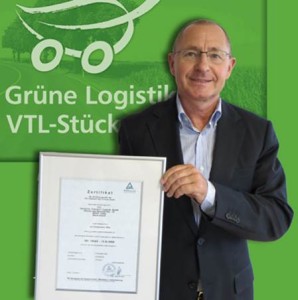TÜV Rheinland recertified CO2 footprint of VTL
TÜV Rheinland has attested VTL Vernetzte-Transport-Logistik GmbH with the correct identification of the Network Carbon Footprint (NCF) for the third time. Following the first certification in 2011 the general cargo system passed this recertification with a partial reduction in CO2 emissions.
Fulda, 28 August 2013 – VTL takes its responsibility to protect the environment very seriously. This commitment can be seen in the recertification of the NCF of the general cargo co-operation to ISO 14064:2006 by TÜV Rheinland. “We not only record the data of VTL GmbH, but also the values of the hubs operated by VTL partners and the proportional values of the VTL depots,” explains VTL Managing Director Andreas Jäschke. This means that data flows into the greenhouse gas balance from both purely transport activities and transshipment and administration.
With this certification the independent TÜV Rheinland auditors confirm that VTL has calculated these direct and indirect emissions correctly. “For us green logistics is no meaningless slogan used for marketing purposes,” says VTL boss Andreas Jäschke. “Instead, it refers to transparency and tangible figures. This enables us to determine that the investment of our partners in energy-saving lighting, in photovoltaic equipment and green buildings is already paying off,” states Jäschke. In the area of partner administration VTL improved CO2 emissions by 25 percent per consignment. In addition, the emissions for transshipment at the depots also fell by 17 percent. However, in the transport field, which accounts for the largest amount of CO2, considerable scope for optimisation remains. The ground has already been prepared for this. Alongside various other projects, this year VTL also began offering seminars for truck drivers on the general cargo network. The objective is to raise awareness among drivers with regard to a foresightful and economical driving style. Because braking technique, gear selection and changing point as well as correct tyre pressure have a significant influence on fuel consumption – and thereby on CO2 emissions. “We aim to make use of this potential,” says Jäschke. In relation to this, a VTL drivers league is currently being prepared for the main routes, in order to reward fuel-saving driving.




